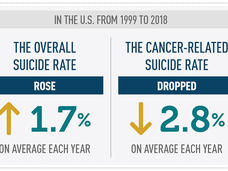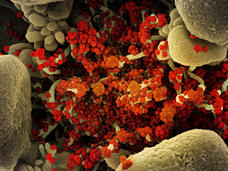| New from NCI |
| Cancer-Related Suicides Decline |
 |
|
A recent study found that suicides related to cancer dipped each year between 1999 and 2018 in the United States. Yet experts say that people who have or have had cancer remain at high risk for suicide and improvements in supportive care are needed. |
| Cancer Centers Bring Hope for Millions |
 |
|
After a breast cancer diagnosis, Vivian Craig received care at the University of New Mexico Comprehensive Cancer Center. She credits the cancer center for her survival. Learn more about how research at NCI-Designated Cancer Centers helps patients. |
Video—Manufacturing CAR T Cells to Expand Immunotherapy Research
Only a handful of research labs in the United States are able to make CAR T cells for use in clinical trials. This video explains an effort to expand and speed up the production of these cells to help more people with cancer. |
| Cancer Researchers Involved in COVID-19 Studies |
 |
|
Since the COVID-19 pandemic began, cancer researchers have brought their expertise to coronavirus studies. Their findings have ranged from insights into how the virus that causes COVID-19 enters cells to which treatments work for COVID-19. |
| SARS-CoV-2 Infection May Mean Lower Risk of Future Infection |
 |
|
An NCI study has found that prior infection with SARS-CoV-2, the virus that causes COVID-19, appears to protect, at least for a few months, against reinfection from the virus. The finding may be important for deciding when to return to physical workplaces and school, deciding who should get the vaccine when, and other activities. |
Breast Cancer Test May Be Less Accurate for Black Women
In a recent study, the Oncoctype DX test, which helps guide treatment decisions for women with breast cancer, was not as good at predicting the risk of death from breast cancer for Black women as it was for White women. The findings highlight the need for greater racial diversity in research studies. |
Ending Structural Racism in Biomedical Research
NCI issued a statement in support of the NIH UNITE initiative to end structural racism in biomedical research. In the statement, NCI Director Dr. Norman Sharpless describes NCI’s equity and inclusion efforts.
|
| FDA Approvals |
CAR T-Cell Therapy for Lymphoma
We’ve added a new drug summary for lisocabtagene maraleucel (Breyanzi), which is a CAR T-cell therapy recently approved by the Food and Drug Administration (FDA) to treat certain types of non-Hodgkin lymphoma. |
Umbralisib Tosylate for Lymphoma
We’ve added a new drug summary for umbralisib tosylate (Ukoniq), which FDA recently approved to treat patients with marginal zone lymphoma or follicular lymphoma that has come back or did not respond to treatment. |